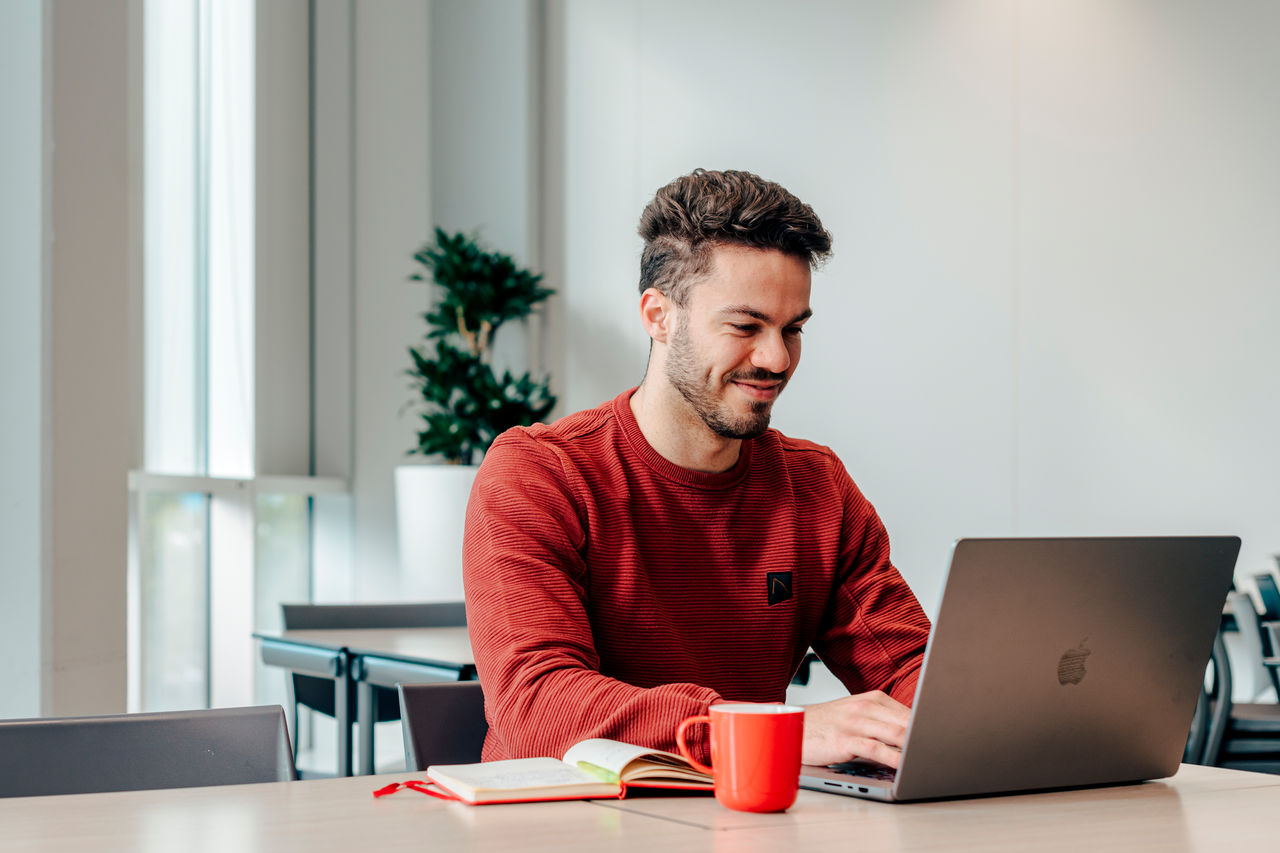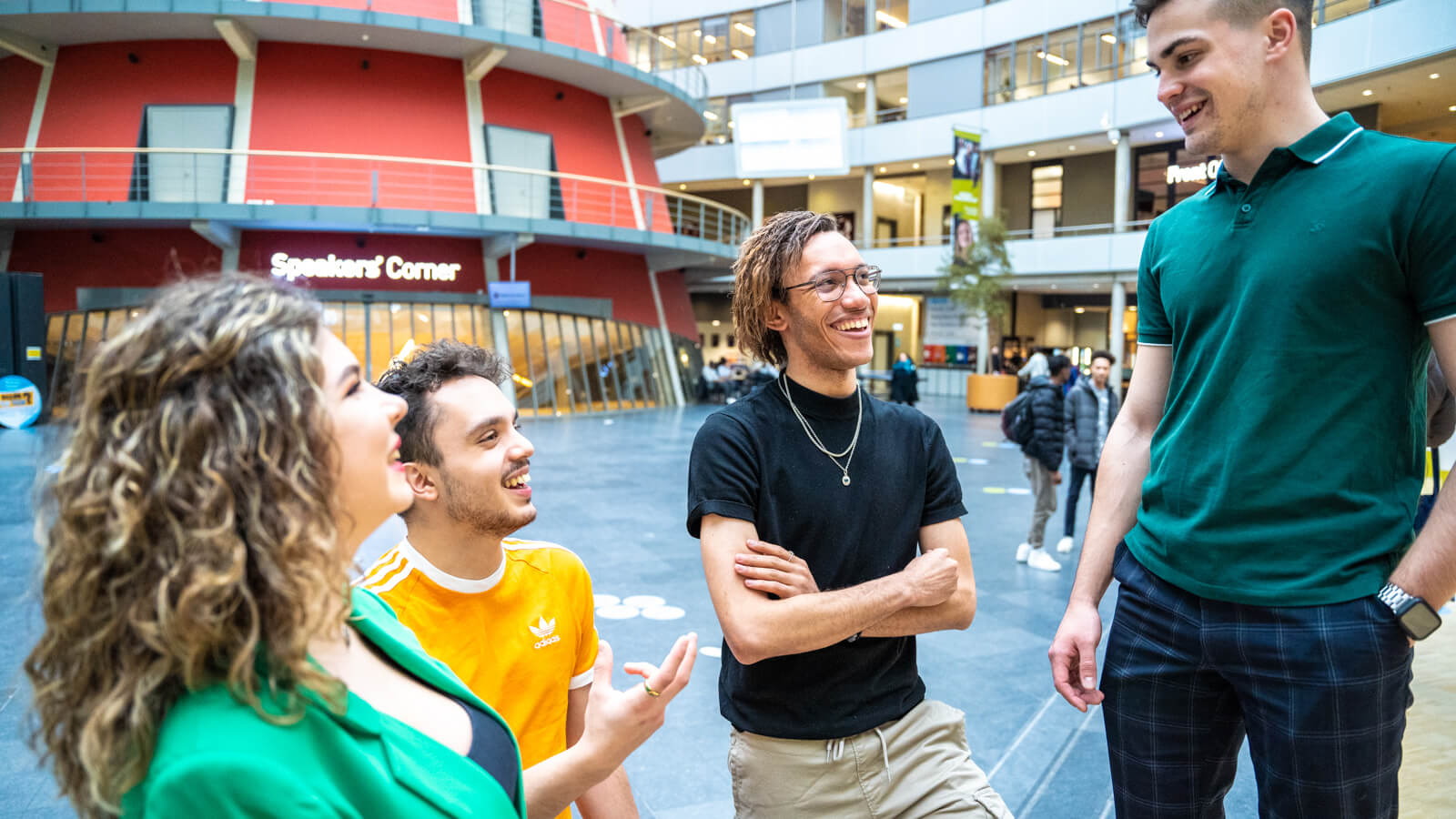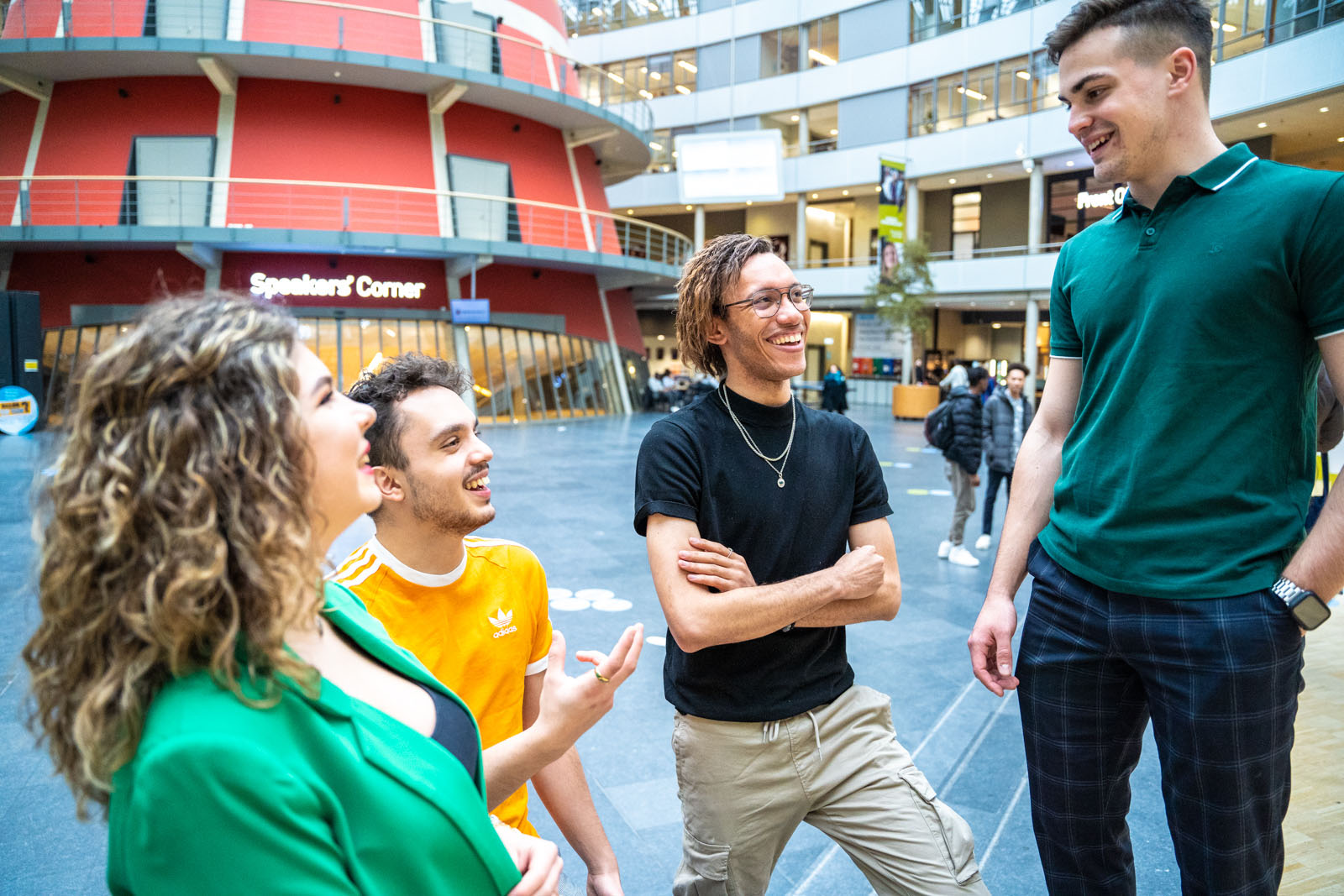Something for you?
How do you solve the societal sustainability challenges of today and tomorrow? In this full-time master’s programme, you’ll work on projects from your own professional environment. This allows you to learn to work in an interdisciplinary way, think critically, and make meaningful changes in systems, processes, and decision-making.
Have you ever heard of ‘wicked problems’? These are the societal sustainability challenges we face today. They’re so complex that there is no single, clear-cut solution. You can’t solve them by viewing them from just one perspective. What’s needed is a multidisciplinary approach. In other words: zoom out first, then zoom in – and collaborate. That’s exactly what you’ll learn in our Master’s in Sustainability Transitions.
In our Master’s in Sustainability Transitions, you’ll learn to think critically – to view issues through a range of expert lenses and from conflicting perspectives. You’ll consider the interests of various stakeholders, and of course, the influence of power on processes. It’s a challenge – because working across disciplines means accepting that no single person can see the full picture. That’s why we provide you with the tools to bring the right disciplines together and to tackle complex issues collaboratively. You’ll learn how to thrive in this complexity and how to make bold, effective decisions.
The content of this programme teaches you to look at the world differently in order to find meaningful solutions. You’ll ask questions such as: Where does the status quo fail to contribute to a healthy world? And how can we change this for the better? This is how we confront tough sustainability challenges – with courage, with care, and with leadership.
After completing this full-time Master’s in Sustainability Transitions, you’ll be part of the next generation of leaders tackling the immensely complex sustainability challenges of our time.
Everything about admission
Admission requirements
hese are the requirements for this master’s programme:
- You hold a relevant bachelor’s degree.
- The programme will be fully in English, so a good command of the English language is required.
- You have a clear interest in sustainability and complex societal challenges.
For more information about the admission requirements, please click here.
Disclaimer on English Language Requirements
The Hague University of Applied Sciences is currently evaluating its English language entry requirements. Applicants should be aware that the minimum standard may be raised to an overall IELTS score of 6.5, IELTS Academic 6.5 with a minimum sub score for each component of IELTS 6.0 (or equivalent by other language test providers*). Any updates will be communicated as soon as possible.
Application procedure
Check the registration conditions or apply directly:
- Register your enrolment in Studielink, our enrolment system.
- Upload digital copies of your CV, relevant diplomas and list of grades. You will hear within a week whether you meet the admission requirements.
- Optional: intake interview. Do you not have a relevant educational entry level but you do have a higher professional education work and thinking level? During an intake interview, the programme manager will assess whether you are sufficiently qualified for the degree programme in question.
- If your employer funds the degree programme, we will ask you for a completed employer's statement. You can print out and upload this PDF. You will receive confirmation by e-mail that you have been admitted to the degree programme. Invoicing will follow after the start, but the employer’s statement must be in before the start of degree programme. You can upload a blank sheet if you don't manage to get the employer's statement signed immediately.
Entry advice
The part-time Master’s in Sustainability Transitions is suitable for graduates of any Applied Sciences University bachelor’s degree. The most important factor is that you have a strong passion for sustainability. We also ask you to demonstrate this.
Admission statements
No exceptions can be made to the official admission requirements. Only the Admissions team can make decisions about your eligibility based on the official rules. You cannot derive any rights from statements made by others regarding your eligibility or information on this website.
Why this programme?
- The Master’s in Sustainability Transitions is hands-on
You’ll be right in the thick of it. Around 80% of the time, you'll be actively working on real-world sustainability transitions. - You’ll learn to work across disciplines
Your classmates will come from a variety of academic backgrounds. You’ll gain valuable experience collaborating in an interdisciplinary setting. - You can make a real impact in the sustainability transition
We’ll equip you with in-depth knowledge of sustainable development, environmental policy, and sustainability innovation – so you can truly make a difference. - Strong focus on personal leadership
Become the best version of yourself with coaching and personal development throughout the programme.
Your time investment
Programme content
What will you study?
Learning Methods
Projects
The curriculum for this programme consists of 80% projects. In these projects, you’ll actively work on transitions. You’ll be in the thick of it! These projects usually take place outside the university, at real-world project locations.
Interdisciplinary
This Master’s teaches you how to work interdisciplinary. This happens quite naturally, as nearly all students have different academic backgrounds. By collaborating on projects, you’ll learn to broaden your perspective. Each student brings their own expertise, and therefore, a different viewpoint. Sometimes, these perspectives may conflict. How do you handle that?
Coaching
There’s a significant amount of coaching in this programme. You’ll work on your personal development. Together with your mentor, you’ll decide where the focus will lie, based on your background and case. One thing is certain: you’ll learn how to communicate clearly, effectively, and inspiringly. You’ll learn to deal with high levels of uncertainty and develop your personal leadership skills. Getting things done! That’s ultimately what we’re here for.
Request a free brochure
Would you like to receive information about the programme in brochure format? Fill out the contact form, and you’ll receive a PDF file via email within minutes.

Testimonials from our lecturers
What can you expect from the academic year? Our lecturers make a quick introduction and tell you more about the degree programme and the classes that they teach.
Career Perspectives
Relevant positions
Process Director for Digital Sustainability
Programme Manager for Inclusive Energy Transition
Transition Manager in Circularity for the Manufacturing Industry
Coach in Systemic Co-design
Policy Advisor or Sustainability Consultant
Sustainability Coordinator
Non-relevant positions
Business process design of Lean Six Sigma coach
Project Manager for CSRD Legislation Implementation
Project Manager for Recycling in a Manufacturing Company
Industrial designer
Project Manager for Energy Supply Procurement
Further studies
Further cademic possibilites include PhD programmes, professional development (PD) programmes, or post-master specialisations in sustainable development and environmental policy.
Practical information
What else do you need to know?
Tuition fee
You will have to pay tuition fees when you enrol on a programme. You can pay in one or more instalments. If you pay in more than one instalment a small administration fee is charged.
More information about tuition fees
Scholarships
Find out more about scholarships for international students. Please note that these scholarships are one-off scholarships only, meaning that if you obtain them it is only for your first year of study.
Student finance
Dutch students qualify for extra financial support via a loan. Dutch students automatically qualify for this financial assistance and international students may be eligible if they have lived in the Netherlands for at least five years or are employed for at least 56 hours per month.
Visa and residence permit
More information about the visas and residence permits.
Help with choosing a programme
What if you’re still unsure?
You might be feeling excited about the Master’s in Sustainability Transitions. But you might also still have doubts or questions – even after attending an Open Day, or speaking with students, lecturers, parents or school counsellors. We're here to help you make the right choice.
- Are you choosing between multiple degree programmes? If so, get in touch with one of our study choice advisors for a personal consultation, or sign up for a study choice workshop.
- Are you specifically unsure about this programme? Then feel free to contact someone from the programme team with any questions you may have. You can do this using the questions button at the top right of this programme page.
Support during your studies
You will receive support with your studies. Balancing study with work can be challenging, which is why we offer guidance. A study coach will work with you during study sessions both at school and at your workplace. Together, you will map out your desired study progress in relation to your workplace and create a personal plan for how you want to shape your studies and personal development. In addition to your study coach, you can turn to our psychologist, counselor, dean, or career center for assistance with any other questions or challenges you may encounter. For more information about deans/student psychologists, elite sports, support with the Dutch language, or studying with a disability, visit our page on study support.
Diploma and Accreditation
Upon successful completion of this Master's, you will receive a diploma from The Hague University of Applied Sciences. You will be awarded the title MSc, Master of Science.
The Master's in Sustainability Transitions is an internationally accredited programme (MVO).
Official details of the programme
This degree programme is registered in Registration of Institutions and Programmes (RIO):
- Official Programme Name: Sustainability Transitions
- Official International Name: Sustainability Transitions
- Programme Code (Isat): Available soon
- Institution Code (Brin): Available soon
Both the official Dutch and the official international name of the degree programme (current at the time of your graduation) will be printed on your diploma.
For more information on the accreditation of this degree programme, see the Accreditation Organisation of the Netherlands and Flanders (NVAO) website.
Downloads
Available soon
- OER
- ELP
Looking for a different programme?
You might find these programmes interesting too!


